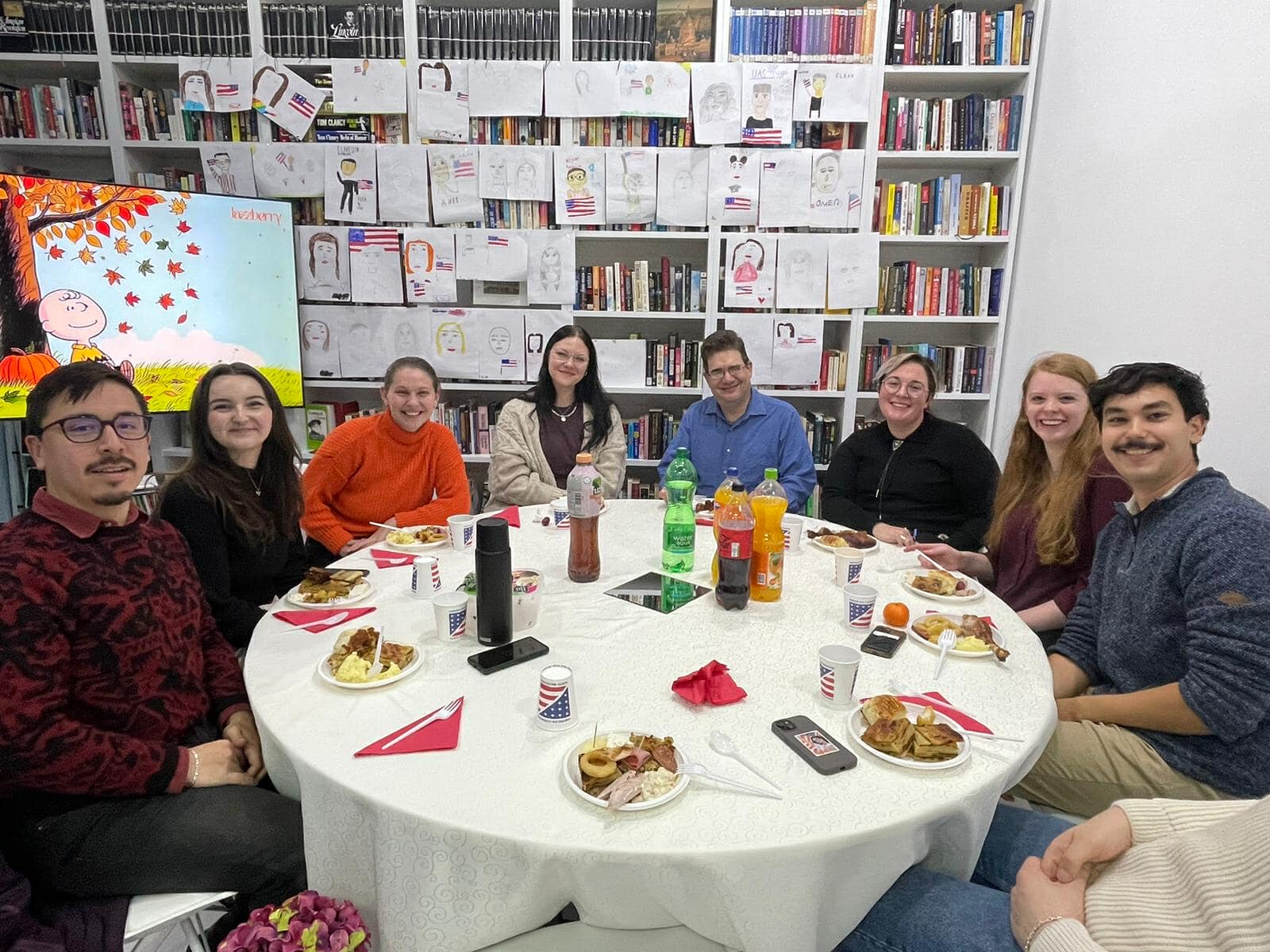I’m about to finish my service. Next week, I’ll be at the Peace Corps office in Skopje to get a final medical checkup, deal with a bunch of paperwork, then ring a ceremonial bell to mark the end of two years of service in North Macedonia.
One of the last things I did was attend the Thanksgiving dinner at the American Corner Tetovo. I was seated at a table of mostly Peace Corps volunteers and Fulbrighters, which we jokingly called “the kids’ table.” Of course, at the age of 53, I was probably twice as old as most of the other people at the table. We had a great time at the dinner. Initially, I planned to bring potatoes to it, but I learned that they had plenty of starch and not enough fruit, so I brought apples, pears, Mandarin oranges and grapes.
Serving in the Peace Corps here has been a great experience. I’ve learned a lot and I’ve helped people understand more about American life. For many of the people I met, it was their first chance to meet an American in person.
Mentoring young journalists through Mollëkuqja was an amazing experience. I’ve had Peace Corps volunteers tell me recently that they were interviewed for a newscast here and the journalist who interviewed them said she knows about the Peace Corps because I mentored her.
And it has also been great to teach classes at South East European University. I ended at the university with a class about the Electoral College and the 2024 election. It’s a topic that was on a lot of people’s minds. And since even most Americans don’t understand how the Electoral College works, it was good to share some information about it. I even went into what happens if nobody has a majority of the electoral vote, something that most recently happened in 1824.
Sure, some things didn’t go as well as I hoped. For example, I only got up to an intermediate low level at the Albanian language, and my Macedonian is even more rudimentary since I served in a mostly Albanian-speaking city. A big part of the problem with language learning is that when I tried to practice Albanian, people would hear my accent and immediately switch to English.
But overall, it was a great experience. I took my colleagues from Mollëkuqja to dinner to thank them for making it work so well. They presented me with a very thoughtful gift, a backpack designed to carry laptop computers. It was wonderful to see them all.
The one person who couldn’t make it to the dinner due to a scheduling mix-up was the group’s founder and president, Rita Behadini, but we got together later to play Scrabble together. She had mentioned early on that she had wanted to play Scrabble ever since she read the novel “The Handmaid’s Tale.” The novel includes a description of characters playing the game. I read the novel back in the 1980s, but the game is such an ordinary part of American life that I forgot all about Scrabble being played in the book. It’s easy to see why someone who had never played would get a bigger impact from that.
I’d meant to play Scrabble with her sooner, but eventually I realized this would be our last chance to do so. So I borrowed the Scrabble game from the American Corner Tetovo and played it with Rita. Although I won the game, she was a lot more competitive than you’d expect for someone who never played before. Also, it really helps to be a native speaker of English in this game; words I used that she didn’t know were “buoy,” “sap” and “gnu.” Those are all legitimate English words, but most English speakers don’t use them often. (But “gnu” does come up in this 1950s novelty song.)
One great thing that came up in terms of moving out is that a new Peace Corps volunteer is taking over my apartment. This means I don’t have to clear everything out; I can leave behind things that will be useful to him. These include bulky things I purchased like an electric fan and a laundry drying rack, as well as many smaller things like pots, pans, plates, glasses, forks, knives and spoons.
I’m looking forward to traveling around the region after my close of service.